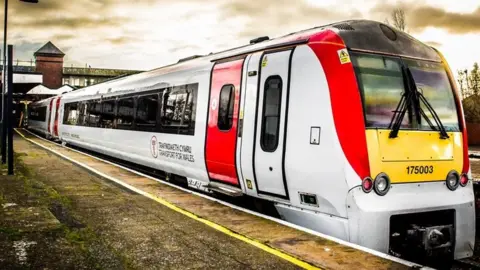Covid: £62m needed to keep Transport for Wales afloat
 TfW
TfWA further £62m of taxpayers' money will be needed to keep Transport for Wales trains going during the Covid pandemic, the economy minister has said.
The service is set to be nationalised in February after a significant fall in passenger numbers since March.
Now, Ken Skates has warned even with additional funding, "difficult choices" may have to be made to keep trains running.
But he vowed to keep services going for key workers.
The TfW rail service - run by KeolisAmey - is set to be taken over by the Welsh Government in February.
KeolisAmey was awarded the franchise in 2018, taking over from Arriva Trains Wales, and covers most of Wales' trains - including key commuter services such as the valley lines.
In a statement before the Senedd on Tuesday, Mr Skates said £62m would help to keep services running until March - this comes on top of £105m of additional funding during the pandemic.
Mr Skates said coronavirus had created "serious challenges" for the sector which services across the UK had "not been able to withstand".
 Cardiff Parkway Developments Ltd
Cardiff Parkway Developments LtdHe said while tickets had provided about half the funding needed to operate services, sales had taken a significant hit. "We are taking the urgent action necessary to protect services, to safeguard jobs and to deliver the ambitious metro programme," he said."This additional funding is essential to provide sufficient services and capacity within a reduced timetable to meet the travel needs of key workers and those with other essential travel needs, such as pupils and students returning to schools and colleges."
But Mr Skates said that as long as passenger numbers dwindled, ticket income would remain low and cuts may have to be made. "We'll need to take decisions about resource availability, operational costs and the potential of continuing to offer a reduced level of service until demand and passenger revenues increase again," he said.
"However, we will take the steps necessary to ensure that key workers and those that depend on public transport will continue to be able to make the journeys they need to."
Opposition parties have previously raised concerns about the financial implications of bringing the service into public ownership.
